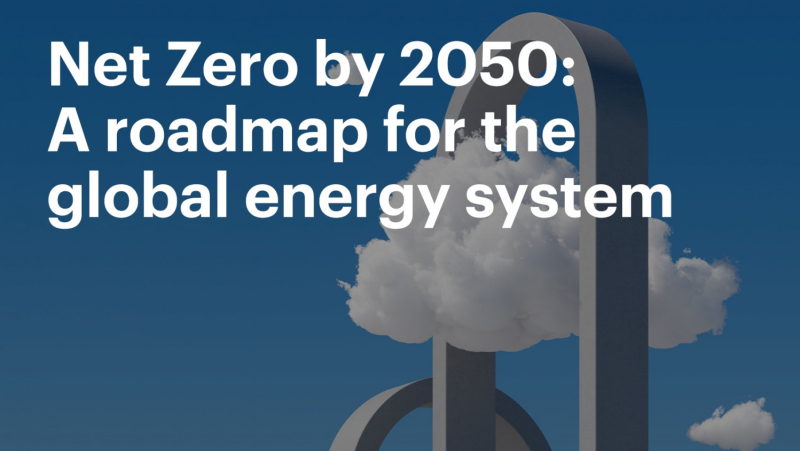The IEA leaves little room for doubt: no fossil fuel expansion in a net-zero pathway
climate@banktrack.org

climate@banktrack.org
Today, the International Energy Agency (IEA) launched a long-awaited new report setting out for the first time an energy scenario that is aligned with the urgent goal of limiting global warming to 1.5°C. The Agency sets this out in its report, “Net Zero by 2050: A roadmap for global energy sector”, which it claims is “one of the most important and challenging undertakings in the IEA’s history”. Although not without problems, its headline conclusion is rock-solid: there can be no new fossil fuels in a net-zero by 2050 pathway. This conclusion is fully aligned with one of the core demands of the Global Call on Banks on the new Fossil Banks No Thanks platform, launched yesterday.
The IEA is considered the go-to source for modelling detailed energy scenarios, which banks, investors and the fossil fuel industry have been using for years to plan and justify fossil fuel production and expansion. Until today one of the largest, if not the largest, shortcoming of the IEA’s energy scenarios was the lack of a scenario that is fully aligned with the goal of keeping the global temperature rise to 1.5°C. The Agency had set out a ‘case’ called Net Zero Emissions by 2050, but its modelling stopped at 2030. The other ‘full’ energy scenarios that the IEA offered, such as the Sustainable Development Scenario (SDS), were not 1.5°C aligned and allowed for decades of continued fossil fuel expansion. It was scenarios like the SDS which the energy sector and its financiers could happily use to justify their increased fossil fuel production.
That dynamic changed today with the launch of the Net Zero by 2050 Roadmap. It’s not just the first full energy scenario of the IEA that is actually 1.5°C aligned, it also concludes that “there is no need for investment in new fossil fuel supply in our net zero pathway”. Simply stated this means that aligning with the 1.5°C temperature target of the Paris Agreement means no new coal, oil or gas anywhere in the world. Civil society groups such as BankTrack and Oil Change International have been reporting this no-expansion principle for years and the principle was also adopted in the Principles for Paris-aligned Financial Institutions, published in September last year and endorsed by 60 civil society organisations globally.
Unfortunately, the new scenario also leaves a lot of room for improvement. For example, it relies on growth in bioenergy (i.e. growing and burning of trees) on an industrial scale, of about 65% between now and 2050, risking biodiversity loss and human rights violations and adding to food insecurity. It also assumes a 40-fold increase in carbon capture and storage (CCS) over the next nine years, which seems wildly optimistic based on the technical feasibility of these projects so far.
What does this mean for banks?
Bank policies on fossil fuel expansion have to date been far from adequate. For example in the recent Banking on Climate Chaos report, most banks did not even score a quarter of the points available on restricting finance for fossil fuel expansion. Such financing totalled almost US$ 1.5 trillion in the last five years, accounting for 39% of all fossil fuel financing. Worryingly, financing of fossil fuel expansion by the world’s largest banks has been on the rise in the last five years and the trend was not halted or slowed down by the Covid-19 pandemic in 2020.
Although the IEA’s new energy scenario is still not fully Paris-aligned, its main conclusion leaves little doubt: 1.5°C alignment means no new fossil fuel projects. Banks can no longer argue that they can align their business model with the goals of the Paris agreement unless they stop all financing for fossil fuel expansion. This means no finance for new fossil fuel projects, and no finance for companies expanding fossil fuel extraction and infrastructure along the whole fossil fuel value chain.
Banks’ own net-zero pledges need to be combined with this “no-expansion principle” to put them on the right path to becoming fully Paris-aligned and meeting the demands of the Fossil Banks No Thanks campaign’s Global Call on Banks. Similarly, a rock solid commitment to immediately halt all finance for fossil fuel expansion was also one of the principles that was lacking in the recently launched ‘Net-Zero Banking Alliance’ (NZBA), which should now be updated to ensure alignment with this new scenario.
Above all, the new IEA scenario makes clear that what is needed, from energy companies and the banking sector alike, is not pledges for 2050 but action now. Any bank that proceeds with financing new fossil fuel projects and infrastructure is undermining the global effort to stop climate chaos. The capital being injected into the fossil fuel industry needs to be urgently redirected to support a massive build-out of clean energy. The task for banks is clear: finance our future, not fossil fuels.
